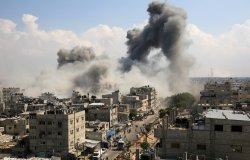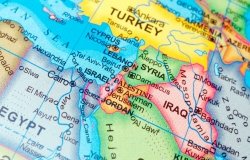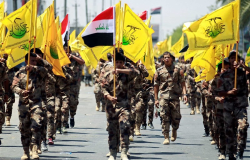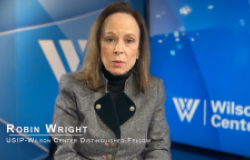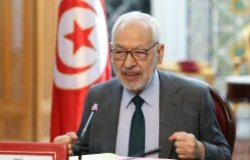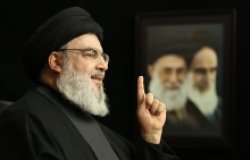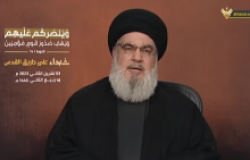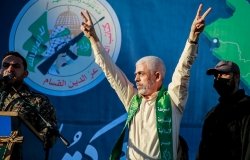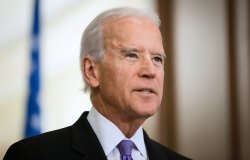The Arab Uprisings in Iranian Politics
Iran hailed the 2011 Arab uprisings as an “Islamic Awakening” and considered the overthrow of U.S.-backed dictators a continuation of its own 1979 revolution. A new report claims that Tehran’s goals are to foster political Islam in the Arab world and Arab independence from U.S. influence—both elements of a broader strategic narrative ultimately radiating from Iran.
Iran hailed the 2011 Arab uprisings as an “Islamic Awakening” and considered the overthrow of U.S.-backed dictators a continuation of its own 1979 revolution. A new report claims that Tehran’s goals are to foster political Islam in the Arab world and Arab independence from U.S. influence—both elements of a broader strategic narrative ultimately radiating from Iran.
Tehran saw the uprisings as an opportunity to “brandish its ideology, point up the success of its ruling system, and counter U.S. strategic communication,” according to Payam Mohseni of Brandeis University. The regime cited the electoral success of Islamist parties as evidence of the regime’s success at home and abroad.
But many supporters of the 2009 Green Movement―the opposition born after the disputed 2009 presidential election― saw the Arab uprisings as a continuation of their demonstrations against the government. The following are excerpts from the brief published by Brandeis University’s Crown Center for Middle East Studies, with a link to the full text at the end.
Iran’s Domestic Ideological Context
While Iran’s narrative of the Islamic Awakening emphasizes the political developments that have occurred outside of Iran’s borders, it is nevertheless fundamentally rooted in the Islamic Republic’s own domestic ideological context and the regime’s interest in projecting its “soft power.” As such, the importance of this narrative must be analyzed from two different yet related perspectives. The first is in the context of the “soft war,” which is the ongoing ideological conflict within which the regime perceives itself to be engaged. The second is within the broader history of the regime’s focus on the Islamization of the social sciences. Since the Islamic revolution, Iran has stressed the development of models of governance and society alternative to those of the West and the modern social sciences, based on Islamic thought. Accordingly, this section looks at how the narrative of the Islamic Awakening is a logical development of both of these outlooks…
The “Soft War”
At the time of the regional uprisings in 2011, the Iranian regime was already engaged in a highly ideological campaign which it referred to as the “soft war” (jang-e narm). The campaign represented Iran’s growing fears of “soft” threats to its rule, as demonstrated by the popular mobilization that occurred following the contested June 2009 presidential election. The green movement, led by opposition candidate Mir-Hussein Mousavi, not only produced the largest protests the country had witnessed since the revolution but also fueled an unprecedented degree of infighting within the ruling elite over the very nature of the Islamic regime…
The soft war, however, extends beyond the challenge posed by the green demonstrations. More recently, with respect to the current nuclear standoff, Khamenei declared at a meeting with university students that the target of the soft war “is what is in your heart, in your mind, in your brain—meaning your will. The enemy wants to change your will.” The soft war, in other words, represents the latest ideological framework employed by the regime to analyze the threats and opportunities it faces with respect to a variety of issues. These ideas, moreover, have not remained solely at the level of discourse and political jargon. Just recently, the Armed Forces General Staff declared that it was establishing a Defense Propaganda Staff (setad-e tablighat-e defai), a Soft War Base (gharargah-e jang-e narm), and think tanks devoted to television and cinema…
Implications of Iran’s Grand Narrative
Iran’s strategic narrative of the Islamic Awakening is relevant to understanding not only Iranian foreign policy (and Middle Eastern foreign affairs generally) but, just as importantly, Iranian domestic politics. The reason is simple and, perhaps, counterintuitive: The development of Iranian thought on the Islamic Awakening—and of soft power more broadly—has been influenced first and foremost by the domestic political scene. Such thinking was spurred on not by geopolitical rivalries or by Iran’s attempts to “export the revolution,” as commonly assumed, but rather by the backlash of theocratic thinkers against their reformist counterparts regarding the very nature of the Islamic regime. Iran’s narrative of the Islamic Awakening is thus one component of the regime’s own ideological campaign to bolster the Islamic Republic and confront oppositional discourse on regime change...
Iran’s main desires are to contribute to the growing Islamization of Arab polities—in whatever shape or form that may take, detached from any specific regime or institutional model—and to encourage the increased independence of Arab states so that they do not toe the line on United States policies, particularly those that intend to isolate Iran regionally. Iran consequently seeks to employ its narrative of the Islamic Awakening that extends beyond the Iranian model to its advantage to expand its reach and pursue its interests in the region more effectively.
Click here for the full text.
Related Program

The Islamists
Learn more about Hamas and how it relates to similarly aligned organizations throughout the region. Read more
